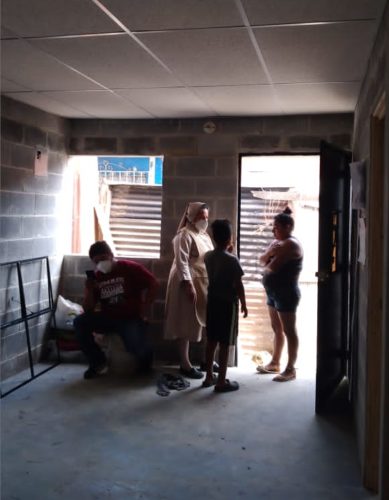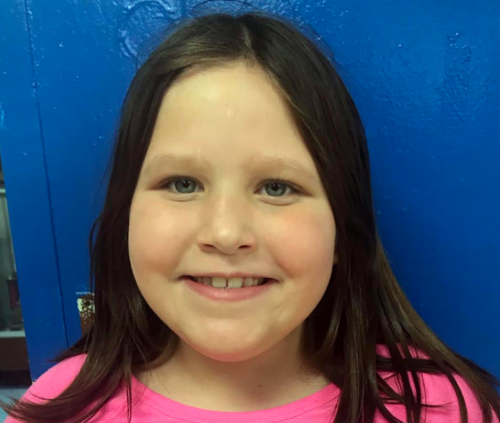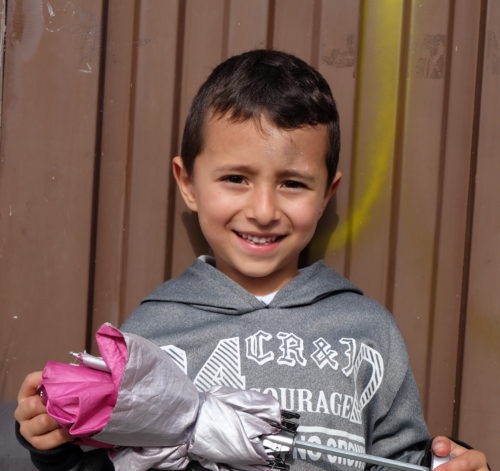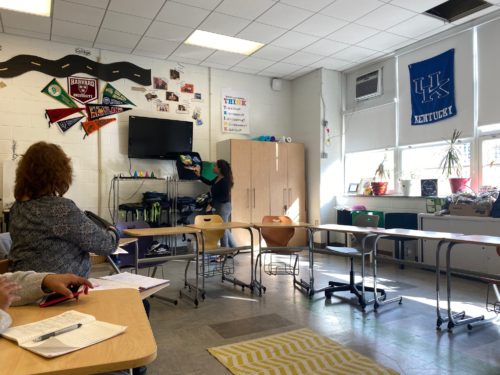At the end of each school year, we receive letters from our volunteer coordinators who share stories of the impact that our sponsors have on the children in our program. Thanks to your support, especially through the COVID-19 pandemic, children in the United States, and around the world, have continued to receive basic needs that have given their families much-needed relief during difficult times. As a way to say ‘thank you’, we would like to share some of these special notes from our coordinators in the U.S.
As a way to say ‘thank you’, we would like to share some of these special notes from our coordinators in the U.S.
A note from Karen
I would like to thank you for all the help you give Knott County Central through Children Incorporated. Thank you for getting our students sponsors. I would also like to thank our sponsors for their monthly sponsorship contributions. It gives our students so much throughout the year. Allowing them to buy clothes and shoes like the other students helps them with their self-esteem and their idea of “fitting in.” It helps these students tremendously and gives them a more positive attitude.
I have several students in single parent households. In one family, the mother is raising three children. The three children would not have clothes to wear if it was not for their sponsorship from Children Incorporated. Their Christmas presents, which were new clothes, were from Children Incorporated. Mom went shopping for them, took their clothes, and wrapped them for their Christmas presents. One of these students is a senior this year, and when he received his birthday money and graduation money, he spent it on fishing supplies. This kid loves to fish. He was so excited to be able to buy a fishing pole so he could go fishing. The little things mean so much to these students.
I have another student who was living with his mom. Most of his clothes also came from his sponsorship money. He is a boot kid — he LOVES his boots. He always wanted to save his money up to buy boots. He just recently moved in with a friend and had no clothes. Thankfully, he had his sponsorship money to buy some. Without his sponsorship funds, I do not know what the student would had done for clothes and shoes.
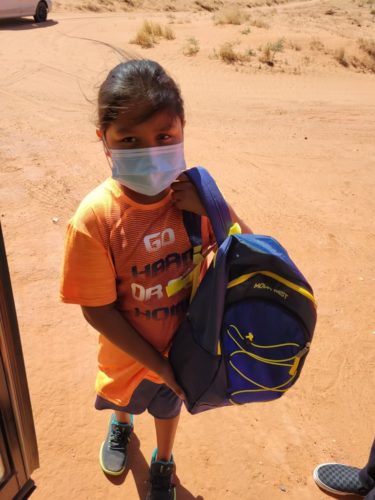
Thanks to their sponsors, children in Arizona are receiving school supplies ahead of the new school year in the late summer of 2021.
I also have several grandparents raising their grandchildren. I have one grandmother raising three grandchildren. She tells me all the time that she does not know what she would do without the help of Children Incorporated. She will call and ask when they need a pair of shoes or clothes. She is always so thankful for all the help that she receives. The students are always so appreciative, always thanking me when they go shopping. When one of the boys was a freshman he would hardly speak to me or look me in the eye. When his sponsor came and saw him, he was shy at first, but after the visit, they started writing to each other. He has come out of his shell. His sponsorship has really changed him. Now he comes in my office and talks forever. Shows me his boots or tennis shoes. He looks forward to his sponsor’s letters and cards. Grandma loves the positive male influence that the sponsor has on her grandson. The boy now wants to join the military. We all know that all it takes is that one special person to change a kid’s life!
Karen, Knott County Central Youth Service Center
Without his sponsorship funds, I do not know what the student would have done for clothes and shoes.
Hearing from Lynn in Letcher County
As the 2020-2021 school year is nearing its end, I can’t help but wonder what the summer and the beginning of a new school year will look like for our students. I’m sure countless other educators and community partners wonder the same. However, it has been a year filled with countless blessings for my students and families.
During this “pandemic year” my office has been filled with Christmas gifts, food assistance, hygiene assistance, shoes, coats, school supplies, and so much more for our students and families that have been made possible by Children Incorporated sponsors. Even during this difficult time, when it would have been so easy to get caught up in other overwhelming problems and situations, Children Incorporated sponsors supported and continued to provide assistance for our students and families.
Several families come to mind. For example, an aunt, the primary caregiver to her middle school granddaughters, an elementary school niece, and nephew. The family struggles with transportation, health, as well as other family beyond her control. Another example is a great grandfather who has sole custody of his great granddaughter. He is also taking care of his wife and great-grandmother, who is dealing with Alzheimer’s. He tries very hard to keep up with his granddaughter’s virtual learning experience as well as keep involved in her volleyball and softball events and practices while dealing with other family members’ issues. Actually, I have several grandparents who are in the same situations. Currently, my families are shopping at a local business to purchase spring/summer clothing and shoes for the Children Incorporated sponsored children. The students enjoy shopping for themselves (with guidance and restrictions) because most of them have never had the means or the opportunity to go on a shopping spree!
Please extend my sincere, heartfelt gratitude and thankfulness to all the sponsors who have been so thoughtful and generous. I saw and continue to see so many smiles and hear so many thank you responses. Needless to say, so many students need to be made to feel special, and caregivers too. This sponsorship provides each student and caregiver unexplainable encouragement and support.
Thank you so much for your help to remove barriers for my LMS students and families.
Lynn, Letcher Middle School
Thanks from Jenny
Although things aren’t quite back to “normal” at Catlettsburg & Ponderosa Elementary Schools, the staff, students, and families are grateful to be back in the building and around people again! As we “round the corner” and summer approaches quickly, we look BACK at fond memories and FORWARD to new beginnings!
Our Family Resource Center currently has all but one enrolled student matched with a Children Incorporated sponsor at this time. A huge SHOUT OUT to the hard-working Children Incorporated staff for working so diligently to assure that enrolled kids are matched in a timely fashion with a sponsor. We cannot express how very grateful we are for all of the kindness your agency shows to our students and their families.
Our goal for the 2021-2022 school year is to enroll 25 students and hopefully have them matched with sponsors at the beginning of the school year. We have reached out to families with younger siblings who already have children enrolled as well as to families who have never been enrolled through the program.
Even though we were unable to allow families to participate in our “Parent/Child Shopping Days” at Walmart this school year, we worked very closely with the families to ensure the kids received clothing, basic needs items, and school-related supplies that they would like and use. The families have been wonderful in sending pictures quickly, progress reports, “Thank You” letters, and friendly letters. I haven’t had to call or send a text to anyone to remind them that those were due to their sponsor.
Needless to say, so many students need to be made to feel special, and caregivers too. This sponsorship provides each student and caregiver unexplainable encouragement and support.
The Family Resource Center recently did a spring/summer shop to close out the school year. Items such as shorts, tank tops, swimsuits, flip flops, and tennis shoes were purchased for students to enjoy outside “Summer Time” fun with their families. Dedra, the mother of Jacari & Jamir (Catlettsburg enrollees) said, “I don’t know what I would do without the boys’ sponsors. Boys grow so fast, and it’s very hard for me to afford new clothing and school supplies for them.” Samantha, mother of Brantley (Ponderosa enrollee) is “very thankful for all of the help [she receives] from Children Incorporated.” She says, “As a mother of five children, all school-age, it’s almost impossible to keep them all in clothes they like and will wear. COVID-19 has slowed down my husband’s work and we really appreciate the extra support.”
Our special needs student’s mother at Catlettsburg had this to say about Children Incorporated and how beneficial it has been to her daughter Aniya: “Aniya loves coloring & drawing pictures for her sponsor. This program has given her the opportunity to participate in activities like all the other kids, even with her disability. She has also taken a growth spurt and now wears women’s sizes which are more expensive for her father and I. Thank you Children Incorporated for your help!”

Our Backpack Feeding Program allows our coordinators to send food home on the weekend with kids in our program.
Along with the basic needs funds, birthday gifts, and holiday gifts, the FRC was once again the recipient of a “Hope In Action” grant for our BOOKS 4 HOME literacy program. Through the assistance we received, we were able to purchase 3 brand new books for every student at the Early Childhood Academy, Catlettsburg Elementary, and Ponderosa Elementary. Due to COVID restrictions, we were unable to let the students come into the FRC and hand-select their own books. However, thanks to our #1 VOLUNTEER, Ms. Sherry, we were able to do a “book bundle” for over 800 students. Sherry worked tirelessly to bundle all of the books together, while our AmeriCorps member, Briley, chose three age-appropriate books for each student. Girl bundles were secured with a pink ribbon, boy bundles with a blue one. The teachers at all three schools report that their students “loved receiving their new books” and felt like it was Christmas! Mrs. Wallace, a 3rd grade teacher at Ponderosa, personally walked her students down to the FRC so they could hand me a “Thank You” letter for their new books; it made my day. Another 4th grade teacher at Ponderosa stated that her students “bartered and traded” the books amongst themselves as soon as they got them. Everyone was very pleased with the ones they got.
In closing, I would like to once again express to each and every Children Incorporated employee how EXTREMELY BLESSED we feel to be in partnership with you. You are truly making a difference in a child’s life.
With love,
Jenny
Catlettsburg and Ponderosa Elementary Schools
With Gratitude from Owingsville Elementary
Owingsville Elementary Family Resource Center wants to take this opportunity to thank you so much for allowing our students to be a part of Children Incorporated. Our students have benefited greatly from the sponsorship program. We currently have 24 students enrolled in the program. We appreciate all the work Children Incorporated does for these children in need.
We started the school year with all students participating virtually. Our principal, Dr. Bailey, started his third year here at OES. Melania Allen was hired as the FRC clerk, but I only have her 60 days for the year. Due to the limited funding, she is also the clerk for the Bath County Middle School YSC and Crossroads FRC. We came back to school in a hybrid mode for a few weeks and then had to have the entire district go back to virtual. February 1st, we started back to hybrid mode and then we were out about 2 full weeks due to snow and ice. In March, we brought all students that wanted to attend back to 4 days a week with Wednesday being a virtual day. That is also how we ended the school year on May 19th.
You are truly making a difference in a child’s life.
OES was at 71% free lunch for the past year, and we had an enrollment of 516 for preschool – 5th grade. We have many students in need, and we are blessed to have the Children Incorporated program at OES. In July and August, I went shopping for Children Incorporated students for back to school items and fall clothing and shoes. In November, I went shopping for Christmas items and winter clothing. At the end of April, I worked on the Children Incorporated shopping list for spring/summer needs and shopped for those and handed them out before school was out for the summer.
The OES FRC was very grateful to receive the Hope In Action grant. We were able to purchase clothes and shoes, hygiene and cleaning items, school supplies and food. Having this grant allowed us to serve even more students and helped us set up a closet to have those items on hand when someone was in need.
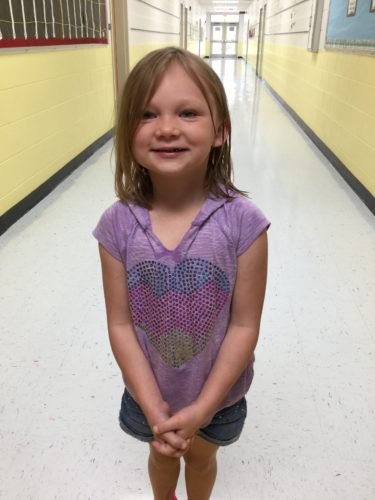
Our sponsors have changed the lives of thousands of children during the 2020-2021 school year and for that we are so grateful!
Our center provided a Backpack Program, where we send home food on the weekends. This school year the backpack program took on many forms. We started with all food bags being sent to families on the meal delivery buses. When we came back to school in the hybrid plan, we sent some on the buses and some home with the child if they attended school. We also made it available for pickup by parents. Near the end of the school year, we were down to just 2 being sent home on the meal delivery and the rest at school. Summer feeding is currently available and the Backpack Program will resume in August, however, we are always available to provide emergency food.
We appreciate all of the Children Incorporated sponsors and staff! We have so many sponsors that send additional funds, cards for holidays and special occasions, send gift cards for me to purchase birthday cakes, send gift cards for special occasion dinners (Thanksgiving, Christmas, Easter) and ones that call me just to get a quick update on the child’s needs. The extra funds provided especially helped one family of 6. To be home all day, every day with 4 growing boys was a challenge for the grandmother, but the sponsor’s help with extra money for food and birthdays made a difference! I appreciate all the time, care, concern and effort that goes into this program. I thank you all for allowing OES FRC to be a part of Children Incorporated. It is a true blessing to our school and families.
Sincerely,
Michele, Owingsville Elementary School
Appreciation from Sandy
I want to thank you and Children Incorporated for all that you do for me and children here at Beaver Creek Elementary. There is no way that I could help these students in need without the support of Children Incorporated. Having sponsorships for these students helps the families tremendously. When I meet the parents at Walmart, they show much gratitude for being able to get clothing and shoes for their children. They tell me how thankful and appreciative they are to have their children sponsored.
We appreciate all the work Children Incorporated does for these children in need.
When our county was hit with flooding early this year, I was worried as to how I could help these families when I don’t have a lot of resources to work with; Children Incorporated was there to assist. One family was totally devastated by the flooding. They lost everything they had and had to relocate. I met with this family at Walmart to get things they were in need of, which was practically everything. When the shopping was done, as we were checking out, the mom became emotional and said “Thank you so much! I don’t know what we would’ve have done without your help.” The little girl without saying a word came from behind her mom and walked up and hugged me and said thank you as well. That was heartwarming to know we helped this family in such a difficult time.
So again, thank you and Children Incorporated for your hard work and supporting the children here at Beaver Creek Elementary. Together we can make a difference for our children and their families. We truly appreciate all that you do!!!
Sincerely,
Sandy
***
How do I sponsor a child in the United States?
You can sponsor a child in the United States in one of three ways: call our office at 1-800-538-5381 and speak with one of our staff members; email us at sponsorship@children-inc.org; or go online to our sponsorship portal, create an account, and search for a child in the United States that is available for sponsorship.
SPONSOR A CHILD
